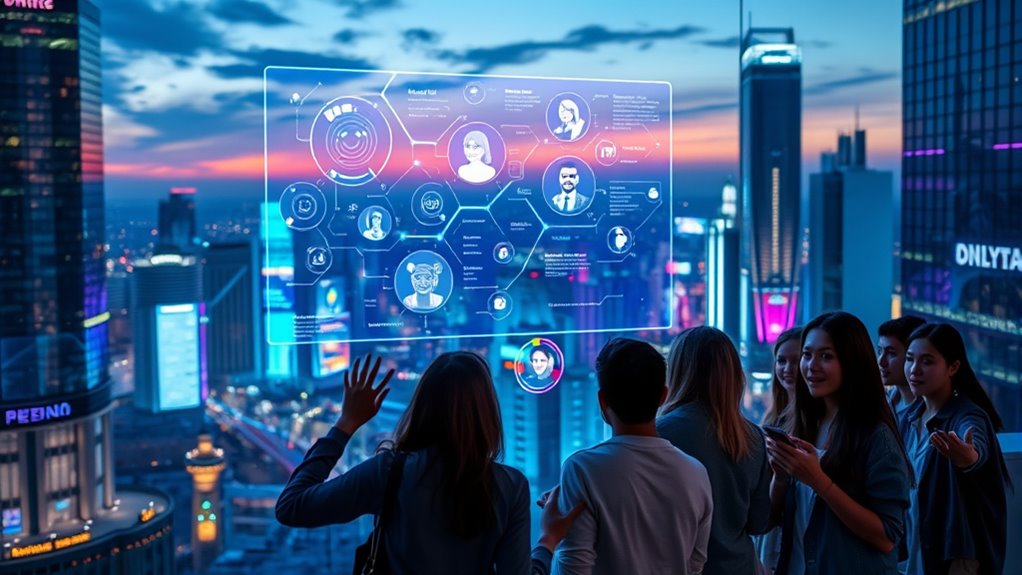Artificial intelligence promises personalized, efficient matchmaking, but it’s not perfect. While AI can analyze large data sets to suggest highly compatible partners, biases and limited diversity often skew results. Privacy concerns also exist, as platforms collect sensitive info you need to protect. Plus, AI’s recommendations don’t always translate into real-world chemistry. If you want to understand how to navigate these promises critically and protect yourself, there’s more you should consider.
Key Takeaways
- AI matchmaking offers faster, more personalized matches but can reinforce biases and lack true understanding of chemistry.
- Data quality and algorithm transparency are critical, as biased data can limit diversity and accuracy.
- Privacy concerns arise from extensive personal data collection, requiring robust security measures and user awareness.
- AI suggestions may create filter bubbles, risking reduced spontaneity and organic connections in the dating process.
- Critical evaluation and balancing AI insights with personal intuition are essential for responsible and effective online matchmaking.
Artificial Intelligence Matchmaking is transforming how people find love by making the process faster, smarter, and more personalized. Instead of relying solely on traditional methods or superficial profiles, AI algorithms analyze vast amounts of data to identify potential matches that align with your preferences, behaviors, and values. This technology promises to deliver highly compatible options, saving you time and effort while increasing your chances of finding a meaningful connection. However, as impressive as it sounds, it’s essential to understand the limitations and challenges that come with AI-powered matchmaking. One major concern is algorithm bias, where the data used to train these systems can inadvertently reinforce stereotypes or exclude certain groups. If the algorithms are trained on biased data, they might favor specific demographics or overlook others, leading to unfair or less diverse matches. This bias can reflect societal prejudices, unintentionally limiting your options or perpetuating stereotypes. It’s important to remember that no AI system is completely neutral, and understanding how these algorithms work helps you navigate their recommendations more critically. Another critical aspect to contemplate is user privacy. As AI matchmaking platforms gather extensive personal information—from your interests and lifestyle to your communication patterns—they collect sensitive data that needs to be protected. If not managed properly, this data can be vulnerable to breaches or misuse, exposing your private life to unauthorized parties. Many platforms use encryption and strict privacy policies to safeguard your information, but it’s always wise to scrutinize their data practices before sharing personal details. You should also be aware of what data you’re providing and how it’s being used. Despite the promise of AI matchmaking to improve the dating experience, it’s not infallible. Sometimes, the algorithms may produce matches that seem perfect on paper but don’t translate into real-world chemistry. Additionally, the reliance on data-driven recommendations might lead to a filter bubble, narrowing your options based on previous preferences rather than encouraging you to step outside your comfort zone. While AI can enhance your search for love, it’s crucial to stay vigilant about issues like algorithm bias and user privacy. By understanding these challenges, you’re better equipped to make informed decisions about how much trust to place in AI-driven suggestions and to approach online dating with a healthy mix of optimism and skepticism. Ultimately, AI matchmaking offers powerful tools, but it’s up to you to navigate its limitations and guarantee your personal data remains protected. Recognizing that health benefits from various lifestyle choices can also influence your relationship and well-being overall.
Frequently Asked Questions
How Does AI Ensure User Privacy in Matchmaking?
You might wonder how AI keeps your privacy safe in matchmaking. It uses data encryption to protect your personal info from unauthorized access. Plus, strict privacy policies guarantee your data is only used for matchmaking purposes and not shared without your consent. These measures help maintain your trust, making the process more secure and respectful of your privacy while still delivering personalized matches.
Can AI Accurately Predict Long-Term Relationship Success?
Like predicting the weather a week ahead, AI can’t guarantee long-term relationship success. It uses compatibility scoring and emotional intelligence to analyze data, but human relationships are complex and ever-changing. You might find AI helpful for initial matches, but it can’t account for life’s unpredictable twists. Trust your intuition and shared experiences more than any algorithm — true connection goes beyond what data can measure.
What Biases Might AI Introduce in Matchmaking Algorithms?
When considering what biases AI might introduce in matchmaking algorithms, you should focus on issues like algorithm transparency and bias mitigation. If the algorithm isn’t transparent, it can perpetuate existing biases, such as cultural or socioeconomic stereotypes. Without proper bias mitigation, AI may favor certain traits over others, leading to unfair matchmaking. Guaranteeing transparency helps you understand decision-making, and implementing bias mitigation strategies ensures fairer, more diverse pairing outcomes.
How Customizable Are Ai-Based Matchmaking Profiles?
You can customize AI-based matchmaking profiles quite a bit thanks to algorithm flexibility. Depending on the platform, you might adjust preferences, interests, and even values to better reflect your personality. The level of profile customization varies, but many systems allow you to fine-tune your profile details, ensuring the algorithm matches you more accurately. This flexibility helps create a more personalized experience, making your matches feel more relevant and meaningful.
Will AI Replace Human Judgment in Dating Decisions?
You might wonder if AI will replace human judgment in dating decisions. While AI can analyze emotional intelligence and cultural diversity to suggest compatible matches, it lacks the nuanced understanding humans bring. You’re still the best judge of chemistry and connection. AI tools serve as helpful guides, but ultimately, your intuition and emotional insight determine the right partner, not just data points.
Conclusion
While AI matchmaking promises personalized experiences, reality shows it’s still evolving. Studies reveal that only about 30% of AI-driven matches lead to long-term relationships, highlighting the hype versus actual effectiveness. So, as you explore these platforms, remember that technology isn’t perfect yet. Keep a balanced perspective, trust your instincts, and enjoy the journey—because at the end of the day, genuine connection goes beyond algorithms.










